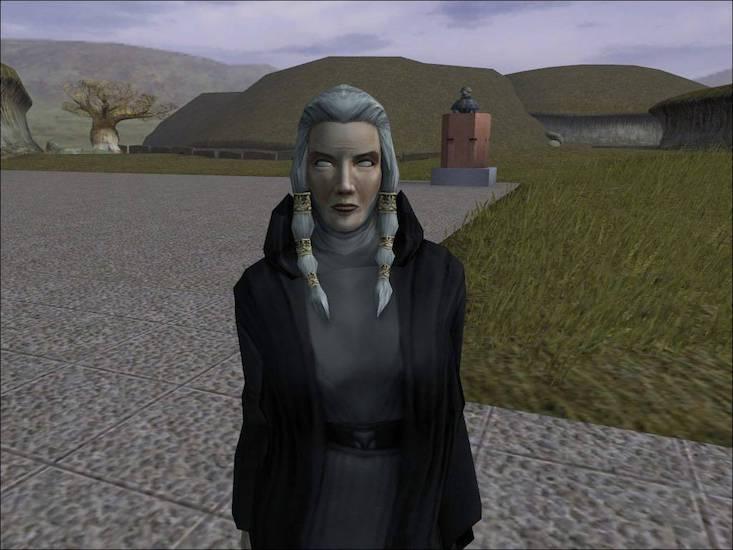
This past “Star Wars Day,” May 4, I watched some of the original trilogy a bit mournfully: Peter Mayhew, who played Chewbacca, passed away the day before. When The Empire Strikes Back took us to the Yoda-dwelling Dagobah, I recalled what the exiled Jedi Master had told premonition-plagued Anakin Skywalker decades earlier, about how to deal with the fear of losing loved ones. “Death is a natural part of life,” he tells Anakin. “Rejoice for those around you who transform into the Force. Mourn them do not. Miss them do not. Attachment leads to jealousy—the shadow of greed, that is.”
Yoda is often held up as an avatar or icon of sagacity. Take a recent example. The psychologist Igor Grossman, who heads the Wisdom and Culture Lab at the University of Waterloo, published a study in January with colleagues on the role of emotion in reasoning wisely. In their study—which involved observational, diary, and experimental methods and almost 4,000 participants—the researchers found that the variety and relative abundance of emotions that humans experience, or “emodiversity,” was linked to wisdom. “The positive association between emodiversity and wisdom-related characteristics occurred consistently for daily challenges, unresolved interpersonal conflicts, as well as political conflicts,” they concluded.
The University of Waterloo promoted the study with a press release titled, “In test of wisdom, new research favors Yoda over Spock.” What the hyper-rational Vulcan represents, Grossman said in the release, is “uniform emotional down-regulation,” whereas the hallmark of Yoda’s judgment style is his ability to “recognize and balance a wide range of emotions.” Spock, in other words, suppresses his feelings while Yoda evens them, and it’s this evenness that aligns with wise reasoning—and well-being. A 2014 study Grossman cites found emodiversity to be an “independent predictor of mental and physical health—such as decreased depression and doctor’s visits—over and above mean levels of positive and negative emotion.”
You could be excused, though, for thinking the language of Yoda—and even the Jedi Code—is more Spockian than Grossman seems to believe. Yoda was right to remind Anakin that we’re born into a losing struggle against death. But don’t mourn or miss the dead? To guard against jealousy and greed, avoid attachments altogether? Yoda seems to be laboring under a sort of cognitive dissonance, recognizing the naturalness of death, but not of emotional bonds and responses. But that might be an uncharitable reading. Yoda, after Anakin asks him what he should do about his feelings of impending loss and death, tells him, “Train yourself to let go of everything you fear to lose.” It’s not that Yoda would rather eliminate the influences of emotion; his aim is to master them. This stems, no doubt, from the Jedi Code, the first line of which is: There is no emotion, there is peace.
Even an act of kindness may have more severe repercussions than you know, or can see.
The Jedi approach to emotion and wisdom echoes what Grossman titled his study, “Wise reasoning benefits from emodiversity, irrespective of emotional intensity.” Several psychological studies in the last decade, Grossman notes, have converged on what wise reasoning means: intellectual humility, acknowledgment of different perspectives, appreciation of the context within which an issue unfolds, sensitivity to the fact that social relations may change, acknowledgment of the likelihood of multiple outcomes of a conflict or action, a self-transcendent viewpoint on an issue, and preference for compromise in resolving opposing viewpoints. He and his colleagues didn’t uncover any mechanisms explaining the relationship between these characteristics and emodiversity, but offered one idea: More varied emotional experiences could encourage greater conceptual knowledge, which might promote wise reasoning. “This idea would imply,” they wrote, “that the central element linking emodiversity to wise reasoning concerns contextually sensitive knowledge,” or “knowledge of how a specific strategy fits a given situation.”
An example might be whether it would be wise to indulge in a spontaneous act of charity. At one point in Star Wars Knights of the Old Republic II: The Sith Lords, a 2004 role-playing video game set 4,000 years before the film A New Hope, you travel to Nar Shaddaa, a crime-ridden moon-metropolis. Right after docking, a beggar confronts you, and you can either kindly give him “five credits” (the Light-Side option) or say to him, “Get out of here before I kill you” (the Dark-Side option). What’s made this encounter an iconic set piece of the game is that, no matter which option you choose, one of your companions—a powerful old woman named Kreia who is, as far as you know, a sort of lapsed Jedi—will offer withering criticism.
Charity, for instance, prompts her to say: “Why did you do such a thing? Such kindnesses will mean nothing. His path is set. Giving him what he has not earned is like pouring sand into his hands. What if by surviving another day he brings greater darkness upon another? The slightest push, the smallest touch, sends echoes throughout life. Even an act of kindness may have more severe repercussions than you know, or can see. By giving him something he has not earned, perhaps all you’ve helped him become is a target.” The game then cuts to a scene showing the beggar being shaken down by another man, and struck down. “Seeing another elevated,” Kreia continues, “often brings the eyes of others who suffer, and perhaps in the end, all you’ve brought is more pain. And that is my lesson to you: Be careful of charity, and kindness, lest you do more harm with open hands than with a clenched fist.” (You can watch her response to the other choice here.)

Kreia is not against helping others—she’s scornful of reflexive and blind compassion. The context demands shrewdness. Nar Shaddaa, to borrow the words of Obi-Wan, is a wretched hive of scum and villainy. Handing out money, in view of so many violent and impoverished people, may not be the best idea. This cold wisdom, and her critique of both the Jedis’ self-abnegating altruistic tendencies and the Siths’ self-destructive power-worshipping, have given people to wonder whether she may be the best-written female character in Star Wars, or all of gaming.
In any case, her wise remarks anticipated a lesson in future Star Wars movies. The lesson being that it is wise to realize that allegiance to one ideology, or set of ideals, isn’t optimal, which is consistent with Grossman’s characterization of wise reasoning, namely the importance of considering multiple perspectives. “One quickly learns that the Jedi Code does not give all the answers,” Kreia says in The Sith Lords. “If you are to truly understand then you will need the contrast, not adherence to a single idea.” Luke Skywalker, in the latest film, The Last Jedi, says, “I only know one truth. It’s time for the Jedi to end.” And of course, viewers of The Last Jedi will remember that Yoda gleefully destroys ancient Jedi texts with a bolt of lightning.
Which is in keeping with how Grossman sees Yoda. As he wrote in his study, “Yoda is known to be emotionally expressive, to share a good joke with others, but also to recognize sorrow and his past mistakes.” Perhaps wisdom is being jolly in owning up to folly.
Brian Gallagher is the editor of Facts So Romantic, the Nautilus blog. Follow him on Twitter @BSGallagher.






























